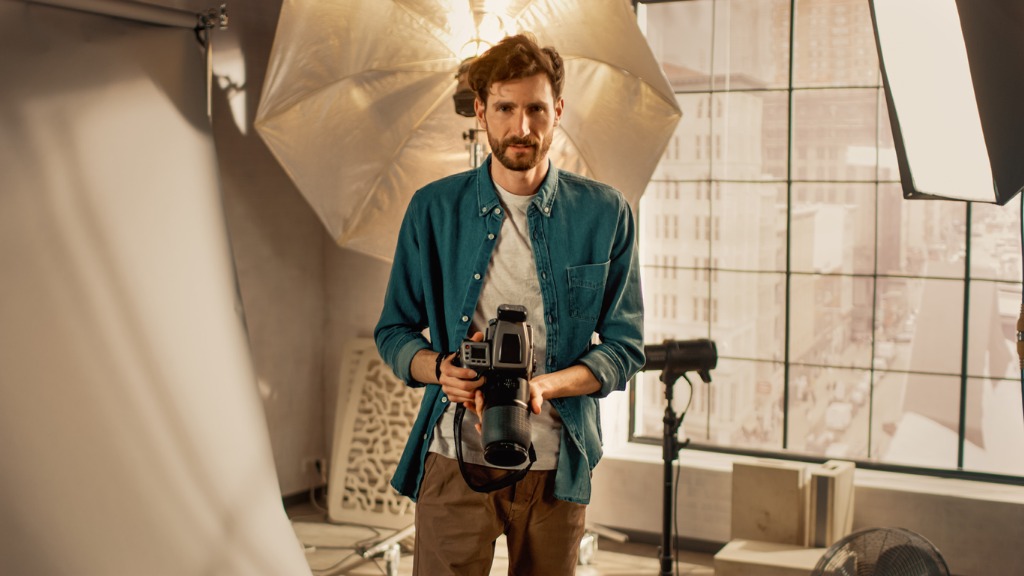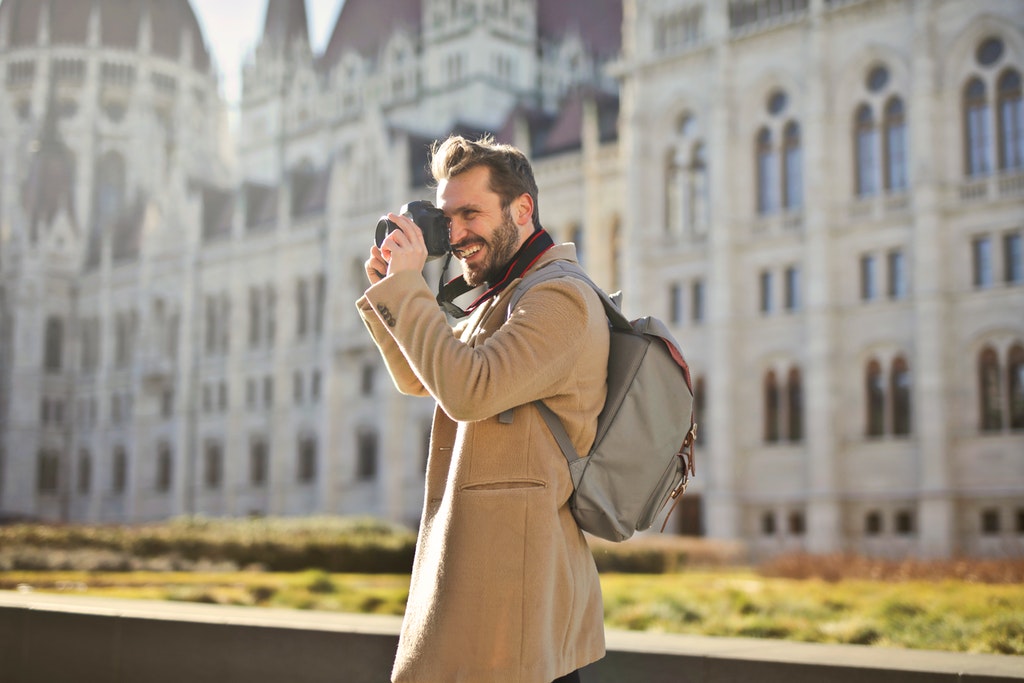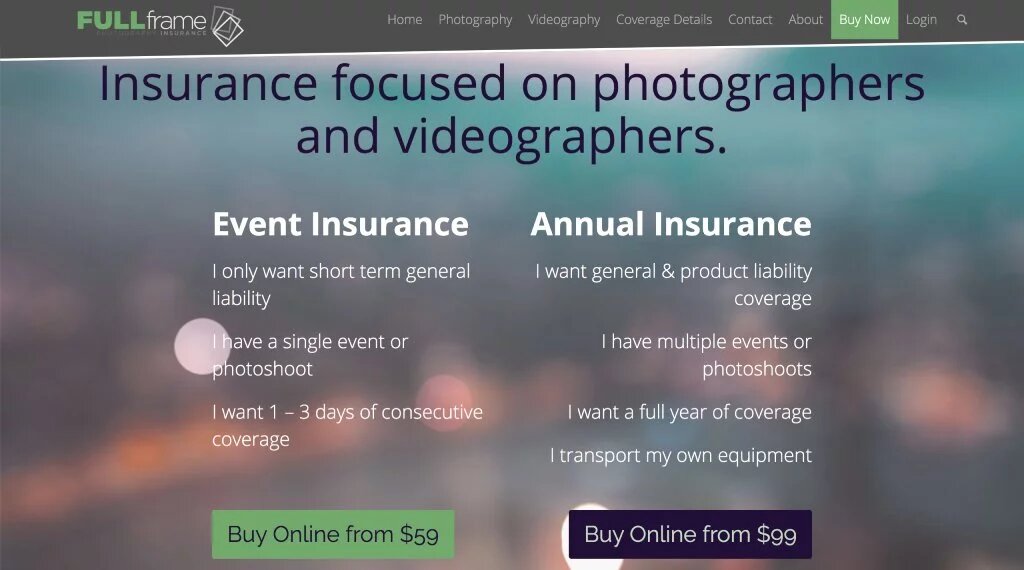5 Things to Research Before Starting a Photography Business

Photo by Rawpixel via iStock
If you haven't figured it out already, starting a photography business is a little more involved than buying a camera and telling people you're a photographer.
To build a photography business that has long-lasting success, you have to start off on the right foot, and that involves doing your due diligence when it comes to everything from building a website to buying photography insurance to ensuring your images and other files are backed up correctly.
In this quick photography business tutorial, you'll learn about some of the most critical - yet often overlooked - aspects of photography businesses that you need to research BEFORE you start your own.
Research Your Startup Costs

photo by Geber86 via iStock
Even if you already have all the photography gear you need, and even if you're going to work from home in a space you've already established for work, you will have other startup costs to get your business off the ground.
You'll need a website, photography business insurance, accounting software (or an accountant!), you'll need to hire an attorney to make everything legal, and you'll have marketing expenses for things like business cards and targeted ads on Facebook.
And that's just the start.

photo by scyther5 via iStock
The point is that you need to spend some time evaluating the true financial cost of starting your business before you ever think about opening your doors.
The better you understand the financial implications of building a business, the better prepared you will be to price your services appropriately, that way you can pay for overhead and other expenses, and still have room left to make a profit.
Get more details about the planning phase of building a photography business in this tutorial.
Decide on a Website Architecture

Photo by Urupong via iStock
Sure, your photography friend in another town might just use Facebook as their "website," but that doesn't mean you should...
Having a website for your business is critical for presenting your work in a professional manner. Think about it - would you rather hire the photographer that has a sleek, professional-looking website with a portfolio or someone that has a gallery on their Facebook page?
Don't get me wrong - Facebook can be a vitally important asset for marketing your business.
But, for me, having a professional URL on your business card is MUCH better than putting a long Facebook URL string.
 Photo by Aramyan via iStock
Photo by Aramyan via iStock
When considering your website, you have to research what platform is best for your particular needs.
Do you have the skills to make something of your own out of a Wordpress template? Does it make more sense to customize a template from someplace like Sqaurespace? Do you have the funds (and the need?) to hire a professional to make you a bespoke website?
Each of these options have their pros and cons, and part of your job at this juncture is to research which of these will work best for you.
Find the Right Web Host

Trust me when I say that one of the most critical things you need to research when starting a photography business is the web host you use.
Back in the day when I started PhotographyTalk, I did some cursory investigations, but after just a few months with my initial web host, I realized that I did not do enough research.
We had all kinds of problems keeping PhotographyTalk online, and when those problems arose, we had even more problems just trying to get the customer service reps from that hosting company to help us out.
I tried a couple of other hosts after that, but not until I found OVH did I finally find a host that gives me the reliable uptime they advertise.
Since switching to OVH, we've had true 99.9 percent uptime, and that has enabled PhotographyTalk to grow by leaps and bounds.
But it isn't just their reliable hosting that has me singing OVH's praises...
Their customer service has proven to be among the best in the industry. Not that I've had many occasions to contact them, but when I have, I've been treated like I'm their only customer and their only concern at that moment. For a global company, that's hard to pull off, yet OVH does it masterfully.
Of course, you need to do your own research and find the right host for your needs. Personally, I can't give OVH a big enough shoutout, but it's important that you see what's out there so you can make an informed decision.
Investigate Back-Up Solutions

Another photography business topic that you need to spend some serious time researching is the appropriate back-up solution for your data.
All too often you hear about memory cards getting fried or a computer's hard drive melting down, and a photographer losing all the data on those devices.
But if you take the time to research back-up storage solutions, you can avoid that same fate and rest assured that your data is safe and secure.
I personally use the Synology DS419 Slim as my back-up device because it's affordable, reliable, and portable.

This compact, 4-bay NAS offers tons of storage in a device that's small enough to sit on top of my desk without taking it over.
In fact, this rig is just 4.72(H) x 4.13(W) x 5.59(D) inches and weighs just 1.46 pounds, so not only will it be a simple addition to your desk, but you can take it with you when you head out for out-of-town gigs.
This unit runs Synology's DiskStation Manager (DSM) just like Synology's bigger storage devices, has RAID protection, file-sharing capabilities, a dual-core CPU, and read-write speed in excess of 220 MB/s and 94 MB/s, respectively.

On top of all that, you can access this device from anywhere using your smartphone and Synology's QuickConnect offers a fast connection via a secure and customizable address.
You can sync files across platforms in moments, use Cloud Sync to keep the device in sync with Dropbox, Google Drive, and other services, and the web assistant makes for ultra-easy setup.
For my money, you simply won't find a better NAS for the money than this. But, again, do your due diligence, get the right back-up for your needs, and protect your images, videos, and other files as they should be protected!
Find the Best Insurance Coverage

Photo by skynesher via iStock
Last but not least, you need to take some time to figure out what kind of photography insurance you need.
What you need in terms of coverages as a portrait photographer who works from home is going to be different from what I might need as a landscape photographer that travels a lot.
And since insurance can be a little confusing for laypersons, getting guidance from the pros is a great first step to take when building your photography business.
I've worked with Full Frame Insurance for a good, long while now, and I have to say that I have been pleasantly surprised with their insurance offerings, their knowledge and professionalism, and their commitment to customer care.
And since no two photographers' needs are alike, Full Frame Insurance offers a variety of policy options that are scalable to meet your specific needs.
The have flexible options, too. For example, you can opt for one-time insurance for an event that covers you for up to three days of work, or if you already have more consistent clients, you can get an annual insurance policy with general and product liability coverage.

Whatever the case may be, you'll find that Full Frame Insurance offers highly affordable plans. Short-term policies start at just $59 and annual policies start at $99.
That's a very small price to pay for peace of mind that if something goes awry, you'll be covered!
You can check prices and buy your policy online 24/7, so don't hesitate to tick this box off your to-do list. Research insurance options, select the right coverage for you, and protect your investment!
We Recommend
Do I Really Need Photography Insurance?

photo by gorodenkoff via iStock
Do you need photography insurance? Many photographers end up being asked to photograph something for some sort of compensation. The compensation is usually money, but there many types of compensation offered to photographers, especially beginning photographers.
After a while, most beginners figure out that the most proper compensation is usually going to be money, not exposure or discounts or other trades. Discounts and trades can be worthwhile in some circumstances, but exposure rarely is. That’s my Beginner Photographer PSA for this week!
Yes - You Need Photography Insurance If You Get Paid

photo byielanum via iStock
Anyways, if you accept a job for payment, you are now entered into a special business relationship. The relationship is between you as a provider and the other person as a client. To protect yourself, you need photography insurance.
Recommended Photography Business Reading:
Homeowners or Renters Insurance Won’t Cover You

photo by sl-f via iStock
Before accepting any work for their photography, a photographer’s equipment could have been covered by their homeowner’s or renter’s policies. Be sure to check directly with your agent, though, as some policies are more limited in what they cover.
But once you cross the compensation threshold, all bets are off. Even something as basic and normally covered such as having your camera stolen from your car won’t be covered by your car insurance if you were on an outing involving photography for payment.
Seriously, the insurance companies base premiums and coverage based on many factors, and what you’re doing with your camera is just one of those considerations. You will need to look at a photography insurance policy that works with your new situation.
Types Of Photography Insurance

photo by fauxels
It’s more than camera loss due to theft or accident that needs to be taken care of. But loss of equipment is one of the important things to protect against. Unlike a renters policy, a photographic policy can offer protection from your own clumsiness in addition to theft.
If you trip and drop your camera, breaking the lens… some photography insurance policies will even take care of you for that. It gives you peace of mind, let me tell you!
The basic types of photography insurance include equipment loss, but also needed is liability and errors and omissions types of protection.

Photo by Andrea Piacquadio from Pexels
Liability insurance is what protects you from being sued because of something bad happening that may or may not be your fault. The bad things could be related to your work, though, so you should seriously consider liability coverage. Bad things could include breaking an antique chair while shooting on someone’s property or someone tripping over your tripod and busting a tooth.
Errors and omissions is what protects you from increased damages beyond losing your payment due to not being able to fulfill whatever contract you had with the client. In film days, this would have included the lab ruining your exposed film rolls. Now it might also include digital card failure or faulty autofocus. Some companies may call it by other names.
Learn More:
Cost of Photography Insurance

photo by eternalcreative via iStock
As seen above, if you don’t have some type of photography insurance, the cost to you can be very high indeed for certain risks involved in working as a photographer. Who wants to get sued for medical expenses or for fixing something very pricy?
The end result of awarded lawsuit damages could include losing your new business all the way up to personal bankruptcy. But, you still want a manageable cost to maximize your profits from the business. That’s where a firm specializing in photography insurance can become your best choice.
How to Get Photography Insurance

Photo by picjumbo.com from Pexels
Insurance providers that specialize in photography insurance make it easy to get the coverage and protection you need
Some of them are online, so you don’t even need to talk to an insurance “salesman,” which is often a source of people’s reluctance to look into insurance.
One of the better photography insurance companies is Full Frame Insurance. They have an easy-to-use website where you can get a quote. You are able to purchase the insurance completely online without having to speak to one of those horrible insurance agents! (I kid, these agents are easy to deal with.)
Getting Photography Insurance is Important and Simple To Do
Here’s how simple it can be to get yourself protected by photography insurance. Go to the Full Frame website, use one of the dropdown menus to look for your particular need. Click a couple of more times, fill out the online forms, and submit payment. Before you know it, you have photography insurance.
Trust me, you should get proper coverage if you are engaging in any endeavor for profit. Photography insurance protects you, your equipment, your business, and your clients. This protection from excess risk gives real peace of mind for working photographers.
Learn More:
- Navigating The World Of Photography Insurance With Full Frame
- How To Turn Your Photography Hobby Into A Career




